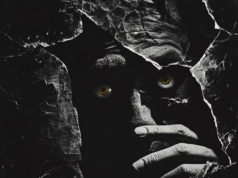Singer-songwriter Taylor Craig Mills’ debut album, Don’t Ever Look Back Twice, has been a long time coming, and it’s a shiny little gem of melancholy pop rock that showcases the main man’s often- extraordinary voice. Mills got so much musical help from buddies like producer-engineer-guitarist Zaq Bell, keyboardist-singer Kris Knight, drummer Damien Stewart, and bassist Jeremy Hull that he decided to release the album as a group effort under the rubric Mills & Co. (Mills has been playing live gigs with many of these musicians). The stripped-down sonic approach is nice for a singer-songwriter but can also be a little predictable. Instead, Don’t Ever Look Back Twice boasts lush, inventive full-band arrangements that give the singer room to interact with a variety of instruments and effects.
Mills has an angelic ache in his voice, a gentle yet dramatic vibrato, and he slides easily into heartfelt falsettos. He sometimes sounds like a choirboy prodigy suffering an existential crisis (that’s a compliment), and his so-sincere-it-hurts approach to many of these tunes amps up the romantic and psychological intensity. “Please take me off the front lines / And give me some peace” he pleads on “To The Skies” as piano and acoustic guitar notes unite and shimmer like sleigh bells. The initially lovely, plaintive “Oh, My Mary” builds to a sing-songy psycho chorus of “I got bullets in the barrel / One for you and one for me” that repeats insistently as the song fades. The string of lonely electric guitar notes in “Barrelin’ Down the Tracks” segues into a chorus of Mills’ voice multi-tracked like a ghostly choir. The lonesome cowboy whistle that opens “9 Lives” finds Mills in unusually confident country-rock mode, but he can’t quite shed his trademark vulnerability. Don’t Ever Look Back Twice offers solidly crafted support for Mills to work through his exquisite angst. –– Jimmy Fowler
Hand Drawn Records’ Bedrooms and Backdoors: Friends and Neighbors
Earlier this month, the Dallas- and Oklahoma City-based Hand Drawn Records released a free compilation album featuring 11 North Texas artists. Adopting a sort of six degrees of HDR approach, the label filled the disc with tunes from groups associated with its four signed acts. These connections give the album continuity, with twang, psychedelia, and indie pop registering only occasionally on the otherwise staunchly alt-rock soundscape, such that forays outside the genre don’t jar the listener. Unfortunately, the cuts on display are so understated, and some so painfully generic, that few make a solid impression.
Top honors go to the recently defunct Fou, whose track “High” is by turns playful and nostalgic, from the rhythmic interplay of guitar and drums to the soft, reverb-tinged vocals toward the end. As W.A. Fite, singer-songwriter Dustin Blocker shows he’s started to outgrow the cock-rock of last year’s debut, Poisoning the Medicine Tree. The new track “Servant No. 1” is a more restrained and meditative piece that successfully juxtaposes digital elements with steady harmonica work. The harp makes a brief cameo on “A Song About Us” from Blocker’s main gig, Exit 380, and the track’s mandolin-laced melody gives way nicely to Igneous Grimm’s spacey and distinctly Southern “The Problem with Sand.”
Loretti, a Los Angeles four-piece fronted by Dallas’ Aimie Lovett (The U.B.A., Wolf Rayet), turns in one of the more ominous numbers on the compilation. “Ursa” chugs quietly, transitioning surprisingly well to the breezy feel of “Turning the Pages” by Always the Alibi. For its first few seconds, the song alternately calls to mind The Sundays and the samples you might hear on early records from A Tribe Called Quest or De La Soul. But the vocals recall the most boring alt-rock of the ’90s; there’s no emotion or nuance in the delivery or the lyrics, a missed opportunity for what could have been a catchy, kitschy throwback.
Comprising associated acts, sister groups, and friends, the HDR compilation flows remarkably well. But there are few standout moments among the 11 tracks, none of which ever quite takes off. –– Zack Shlachter
Deaf Angel’s We Will Rise
After listening to only a song or two from We Will Rise, the most recent EP from the Fort Worth metal group Deaf Angel, it’s almost impossible to avoid the comparison: Vocalist Tina Downs sounds a lot like Amy Lee of Evanescence or Lacey Sturm of Flyleaf. She must get that all the time.
But, hey, who says that comparison is a bad thing? The chick can sing, and it’s always refreshing to encounter a female vocalist who knows how to finesse the microphone without disappearing into all the frenetic drumming and barre-chord crunching behind her. In fact, Downs’ voice sets We Will Rise apart from the ocean of other EPs from the local metal scene, a traditionally testosterone-y club.
Not that guitarist Lee Daniels, bassist Kelly Robinson, and drummer Scott Van Slyke don’t know what they’re doing. Their chops are obvious, whether on the head-banging opener in “Rise Up” or during the melodic, almost hypnotic, “Goodbye,” the album’s penultimate track. They also know how to tone it down, as on the song’s finale, “Believe,” in which Deaf Angel cuts the power and goes acoustic, giving Downs’ piercing pipes the spotlight.
But what’s with the brevity? Four tracks? You would think that a band that has been together for seven years — albeit with countless member changes — could offer more than just 15 minutes of metal. — Matthew McGowan












